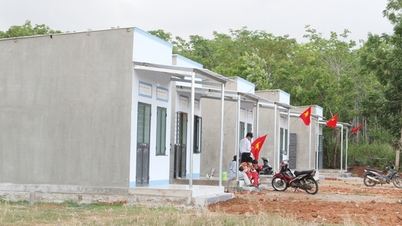
Prime Minister Pham Minh Chinh attended and chaired a dialogue with businesses and business associations to effectively implement Resolution 68-NQ/TW of the Politburo on private economic development - Photo: VGP/Nhat Bac
Bringing Resolution 68 into life: Need for synchronous and drastic action
In the context of an uncertain global economy , the Politburo's issuance of Resolution 68/NQ-TW on private economic development is a strategic move. The Resolution sets out eight groups of tasks and solutions, emphasizing three strategic breakthroughs: institutional improvement, human resource quality improvement, and infrastructure development. This is considered the "pillar of institutionalization" of development orientations approved by the Politburo in important documents.
At the Dialogue with enterprises and business associations to effectively implement Resolution 68-NQ/TW of the Politburo on private economic development chaired by Prime Minister Pham Minh Chinh, Deputy Minister of Finance Le Tan Can said: The Government's guiding spirit is to move immediately, from the planning stage to specific actions. Ministries, branches and localities must develop and issue plans to implement Resolutions 138/NQ-CP and 139/NQ-CP according to the "6 clear" principle: clear people, clear work, clear responsibility, clear authority, clear time, clear results.
Meanwhile, the business community is required to improve its management capacity, build business ethics, and avoid short-term thinking. Large enterprises need to play a leading role, while small and medium enterprises need to orient sustainable development to become medium and large enterprises.

Minister of Finance Nguyen Van Thang speaks at the seminar - Photo: VGP/Doan Bac
Speaking at the seminar, Minister of Finance Nguyen Van Thang emphasized: Never before has the Party and State paid such attention to private enterprises as they do now, from recognition to assessment. However, besides that, the burden on us is also very large, our responsibility is very great, because Resolution 68 has set out very large and very high goals for private economic development to contribute to economic growth as well as strive for the country to develop by 2030-2045.
The goals are very big, for example, by 2030 our country will be a developing country with modern industry and high average income or by 2045 it will be a developed country with high income. Therefore, if the country wants to achieve this goal, we must make great efforts to achieve the goals set out in Resolution 68.
With the responsibility of being the advisory body for the Government to implement Resolution 68 of the Politburo, we will concretize the groups of solutions as well as the 3 strategic breakthroughs in this Resolution as soon as possible. In Resolution 68, the instructions and solutions are also very clear, so the development of decrees and guiding documents of the Ministry of Finance as well as ministries and branches is not too complicated.
"The most important thing is that we have submitted to the Government to work with ministries and branches to soon issue decrees and guiding documents to put these policies into practice immediately," the head of the Ministry of Finance emphasized.

Governor of the State Bank of Vietnam Nguyen Thi Hong speaks at the seminar - Photo: VGP/Nhat Bac
Credit, interest rates and support policies need to be balanced and proactive.
From a monetary policy perspective, State Bank of Vietnam Governor Nguyen Thi Hong said that credit to the private sector now accounts for 92-93% of the total outstanding credit of the economy. This is a positive signal, showing the increasingly important role of the private economy.
However, according to the Governor, the group of small and medium enterprises - which account for nearly 98% of the total number of enterprises - only has access to less than 20% of the total outstanding loans, clearly reflecting the difference in access to capital. Part of the reason comes from limited management capacity, lack of transparency in financial information and failure to demonstrate the ability to repay debts.
It is worth noting that the banking sector has maintained its spirit of cooperation. The lending interest rate level has been continuously adjusted downward in the context of rising world interest rates. Credit institutions have balanced themselves to reduce interest rates, without using state budget resources, with a total support amount of up to 60,000-70,000 billion VND.
The SBV leader said: Some credit packages have been implemented, such as supporting aquaculture and lending for social housing, showing that the banking system is making efforts to diversify capital access channels. However, procedural barriers still slow down capital turnover, increase actual costs and create interest rate pressure for businesses.
According to the State Bank, to deal with this issue, it is necessary to continue reforming laws such as the Investment Law, the Bidding Law, etc. as currently directed by the Government. When the investment environment is transparent and procedural costs are reduced, the conditions for lowering interest rates will also become more feasible.
"On the part of the State Bank, the management direction remains consistent: supporting businesses while ensuring the goals of stabilizing the macro economy, controlling inflation, stabilizing exchange rates and the foreign exchange market. This is not an easy task, especially when the Vietnamese economy is highly open and sensitive to global fluctuations," Governor Nguyen Thi Hong emphasized.
Mr. Minh
Source: https://baochinhphu.vn/doi-moi-the-che-khoi-thong-dong-von-cho-dn-tu-nhan-102250531171224511.htm
































































































Comment (0)